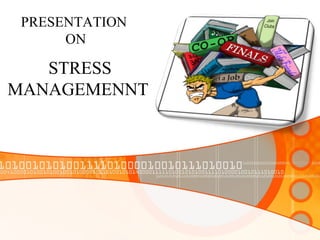
ppt on Stress management
- 2. Content Introduction Of Stress Types Of Stress Introduction Of Stress Management Advantages Disadvantages Types Of Stressors Case study Conclusion
- 5. 10/27/13 5
- 6. Meaning of stress Stress can have a big impact on your body, in ways that are felt by just you, and in way that the world can see. One of the more visible potential by-products of stress is weight gain--many people find themselves to be "emotional eaters" who react to stress by reaching for something--often the wrong thing-to eat. Stress can also create a loss of apetite, which can be a problem as well.
- 7. Signs Of Stress Signs Of Stress Physical signs Mental signs Behavioural signs Job Stress Signs PROBABLE SYMPTOMS Insomnia Loss of mental concentration Absenteeism Depression Extreme anger and frustration Family conflict Migraine, Headaches and back problems
- 9. Causes of stress Job Insecurity High Performance Demand Bad Boss Workplace Culture Personal or Family Problems Technology
- 11. Eustress Eustress, or positive stress, has the following characteristics: •Motivates, focuses energy •Is short-term •Is perceived as within our coping abilities •Feels exciting •Improves performance
- 13. DISTRESS In contrast, Distress, or negative stress, has the following characteristics: •Causes anxiety or concern •Can be short- or long-term •Is perceived as outside of our coping abilities •Feels unpleasant •Decreases performance •Can lead to mental and physical problems
- 14. Negative Stress Results Loss of motivation Reduces effectiveness Physical, mental, and behavioral problems
- 15. 10/27/13 15
- 16. Work-related stress can result in high levels of employee turnover. Employees experiencing stress are more likely to make poor decisions and casual errors. Workplace relations and customer service may deteriorate 10/27/13 16
- 18. Cont. Be Prepared for Changes Find and protect time to refresh, re-energize and re-motivate. Avoid giving in to alcohol, smoking and other substance abuses. Positive attitudes towards stressful situations in life. Don't be complacent. Sit straight and comfortably on your seat, and try breathing exercises Try creative visualization
- 19. Stress management It is the amelioration of stress and especially chronic stress often for the purpose of improving everyday functioning. Stress produces numerous symptoms which vary according to persons, situations, and severity. These can include physical health decline as well as depression.
- 20. Types of Stress management (A)Acute Stress Acute stress is usually for short time and may be due to work pressure, meeting deadlines pressure or minor accident, over exertion, increased physical activity, searching something but you misplaced it, or similar things. Symptoms of this type of tension are headaches, back pain, stomach problems, rapid heartbeat, muscle aches or body pain. (B)Chronic Stress This type of stress is the most serious of all the 3 stress types. Chronic stress is a prolonged stress that exists for weeks, months, or even years. This stress is due to poverty, broken or stressed families and marriages, chronic illness and successive failures in life. People suffering from this type of stress get used to it and may even not realize that they are under chronic stress. It is very harmful to their health
- 21. Causes of Stress Management Whenever our body feels something not favorable, then it tries to defend itself. If this situation continues for a long time, then our body is working overtime. There are several causes of stress. For example, you are under stress when you are worried about something, worried about your children, worried about the illness of your father, worried about your job security, or worried about your loans or similar things.
- 22. Advantages of stress management Business advantages of stress management: Less absenteeism due to stressrelated disorders Less worker's compensation loss due to stress-related illness or accidents Improved job performance Less stressful, more efficient workplace Improved employee attitude Improved employee overall health
- 23. Disadvantages of stress management Stress is a disadvantage because it can potentially raise your heart rate and weaken your immune system. Also, it can be a factor in poor decision making because under stress we may not think logically or consider the consequences of the choices we make.
- 24. Relief from stress Stop shallow breathing
- 25. Create the habit of deep breaths
- 26. Visualize and communicate your vision
- 27. Laugh 1.Crack some jokes. 2.Do your goofiest impression 3.Tickle a child that you love.
- 28. Be aware of your choices; you always have a choice
- 29. Learn to say no; you cannot do everything you are asked.
- 30. Be thankful
- 31. Do nothing. That's right, folks, do nothing at all. Close the door, open the window, have a seat, and take a little break from life. If your mind is racing, learn to meditate and just let that stress go.
- 33. ABC Strategy A = Awareness B = Balance C = Control
- 34. 10/27/13 34
- 35. So enjoy your life as it comes ………..and always be happy
- 36. CASE STUDY
- 37. CONCLUSION Stress problems are very common. The American Psychological Association's "Stress in America" poll found that one-third of people in the United States report experiencing extreme levels of negative stress. In addition, nearly one out of five people report that they are experiencing high levels of negative stress 15 or more days per month.
